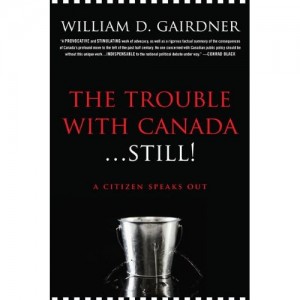 Warning: this post will anger, no matter your political stripe. At just under 1500 words, it’s longer than usual. Don’t dismiss the comments; be ready to argue the issues with evidence.
Warning: this post will anger, no matter your political stripe. At just under 1500 words, it’s longer than usual. Don’t dismiss the comments; be ready to argue the issues with evidence.
Dr. William Gairdner, retired English professor, writes a 45 page critique of Medicare in a chapter titled, “Medical Mediocrity: An Autopsy on the Canadian ‘Health Care’ System”, in his book “The Trouble With Canada…Still” BPS Books, Toronto, 2011 (p 284-329).
He upsets all of us, left and right, with an unfiltered critique of Medicare. His jeremiad stings and cuts, but we need to hear what he says. Here are some highlights [italics original].
Dr. Gairdner writes that, in light of Canada spending 183.1 billion on healthcare in 2009 and increasing at 6.5% per year,
“I think Canadians should demand a lot more. But I will explain how we are powerless to do that now because we surrendered our freedom of medical choice many decades ago when, like sleepwalkers, we accepted without much protest a top-down bureaucratic control of government-rationed medicine, and we and our physicians fell under the threat of criminal punishment for attempting to exchange our own money for the treatment of our own bodies, as we had always previously done.
The same citizens who would scream bloody murder if told that from now on they could buy or rent only a government-made home, or had to buy and wear only government-made pants, dresses, and shoes, or had to purchase and eat only government food, suddenly thought it quite normal to have politicians dictating, regulating, and rationing the quality and amount of health care they would be permitted to have for themselves, their failing parents, or their sick children.”
Healthcare consumes nearly 50% of provincial spending because
“…in a system offering unlimited ‘free’ health care as a right, there is no reason why it shouldn’t eventually climb to 75 percent or more. This trend is inevitable because as human nature and economic theory have always predicted, the demand for an unlimited ‘free’ commodity is infinite. Of course, nothing in life is free. It is ‘pre-paid’ via tax extraction and/or debt financing, and whenever there is unrestricted demand, it must be strictly rationed…
…most are shocked to learn that no government health care system has any necessary relationship to the status of a population’s health, even though politicians in their quest for votes present them as if they do. Japan, for example, which also has a universal public system, spends per capita about 40 percent less than Canada, but its population is far healthier than ours.”
In reviewing the history of our system, Gairdner says
“Our national ‘health insurance’ program is no insurance at all. The very term is deceptive. For like many other government programs…it is a sort of pyramid, or Ponzi scheme, by which the working young at the bottom bear most of the burden for the old at the top…Canada does not have a single penny of medical ‘insurance’ in a financial pool generating revenue to cover the costs of health care…our socialized medicine ‘plan’ is yet another cradle-to-grave welfare scheme intended to relieve citizens of all their health worries… [Politicians] rammed into public policy what honest health economists call an ‘open-ended scheme with closed-end funding.’”
He goes on saying
“…to make good on its new political promise, the State had to hand itself the legal power to supervise and to ration; that is, a State right to rupture the professional private relationship between physician and patient, to police the work of hospitals, to examine, proscribe, and dictate available services, to examine patient records without any knowledge of patients, and so on.”
Dr. Gairdner describes patients as trapped but devoted to their captors, a case of Stockholm syndrome.
In a section titled ‘Organizing Scarcity’, he writes
“People primordially fear illness and death, and physicians, from shaman to modern scientists, have always been perceived as holding a near-talismanic power over both. With the rise of modern wealth came the potential for enormous tax harvesting, and politicians were quick to see that this power over life and death could generate deep feelings of gratitude and loyalty. Could they take this power unto themselves? ‘Health care’ provided innumerable situations and sound bites evoking public pity and concern – irresistible material as ripe for the front pages as it was for takeover by politicians wanting to be thanked with votes.”
In ‘Screwing the System’, Gairdner says that some MDs could defraud the system. He writes that health economist Malcolm Brown said
“…some doctors, in an attempt to increase their incomes under medicare’s fixed lower rates, may resort to: ‘time shuffling’ (treating patients on overtime hours, to increase fees); ‘upgrading’ (the paying agency is billed for a service that pays more than the one actually performed); ‘injury enlargement’ (overstating the nature of the problem); ‘ping-ponging’ (referring to other physicians or professionals without sufficient reason); ‘service splitting’ (splitting the treatment into many smaller fee-paying parts); ‘phantom treatment’ (billing for services not performed); and ‘assembly line’ treatment (patients treated at too high a speed)….While no one can be sure how much of this is going on, suffice it to say that the perverse economic incentives built into any socialized system creates a perfect environment for such activities. The physician doesn’t care (because he or she is ripping off an impersonal government); the patient doesn’t care (because ‘it’s free’).”
He goes on
“It takes some pondering to realize that in a socialized medical system patients always count as an expense, or cost to ‘the system,’ and physicians under socialism represent ‘a huge cost-generating entity’…This is why a hospital that has a limited public budget will be eager to skimp on or delay services, and will kick you out of your bed as soon as possible; but a private hospital is happy to have you feeling better before you go home – ‘Stay another day!’ The sour receptionist in the socialist hospital is not so happy to see you because you represent more damn work.”
An epigraph from the Supreme court reads
“The evidence in this case shows that delays in the public health-care system are widespread, and that, in some serious cases, patients die as a result of waiting lists for public health care.
– Supreme Court of Canada, Chaoulli v. Quebec, June 9, 2005”
Gairdner mentions that in Britain, after which our system is modeled, in 1978 had
“…five health administrators for each hospital bed. There are no such figures available for Canada, but rest assured there are a great number of health administrators on handsome salaries or contracts crawling all over Canadian hospitals right now, obedient to their political bosses (who pay them), arrogant to medical professionals and patients (who ‘drain the system’), all the while searching desperately for ways to cut costs by more rationing of care. Socialism always results in a downward pressure on quality and an upward pressure on costs.”
He lists eight separate tiers to correct “the myth of single-tier medicine in Canada”, and discusses how elite athletes, incarcerated criminals, and workers compensation cases “go to the front of the queue.”
Gairdner quotes a former CMA president in another epigraph:
“You can’t force a citizen in a free and democratic society to simply wait for health care, and outlaw their ability to extricate themselves from a wait list.
Dr. Brian Day, former president, Canadian Medical Association”
He includes detailed statistics showing that
“…public medicine in the U.S. only runs at 7 percent of GDP, same as Canada. The rest is not a cost, it is private investment by free people in their own health care and in the medical system that provides it.”
He ends with a list of solutions that include:
- Encourage all Canadians to carry ‘major medical and catastrophic insurance’, which is relatively cheap
- Eliminate first dollar insurance; bring in user fees
- Continue a public option for basic care with a user fee
- Allow private offerings to compete with public medicine
- Support only the truly needy with ‘free’ care
- Put freedom and responsibility back with individuals
- State must stop telling citizens how much of their own $$ they can spend on their own health
- Experiment with many more retail health clinics where services can be purchased and medications dispensed
- End the ‘lawsuit lottery’ by legislating a liability limit to malpractice suits
- Issue health insurance vouchers to the truly needy and chronically ill to purchase additional insurance
- Start medical savings accounts
I would encourage you to read the whole chapter, if you have time. It’s impossible to capture even a fraction of the content.
How are we going to start the discussion? How can we help improve healthcare in Canada?
 Engagement is over-used; we don’t need more of it. We need partnership, not engagement. Leaders want supportive followers, but do not want to give up command and control for partnership.
Engagement is over-used; we don’t need more of it. We need partnership, not engagement. Leaders want supportive followers, but do not want to give up command and control for partnership.

